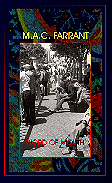


|
Word of Mouth.
M.A.C. Farrant.
Grades 9 and up / Ages 14 and up. **** /4
|

excerpt:
"....but I got a real talent - I was born with it. Like some people are good at playing the guitar or being hairdressers. Me, I got talent when it comes to guys. Zeroing in on the assholes. Always falling for a good looking face or a smooth line ... What's the matter with me anyhow? How come it keeps happening? Because I'm always hoping the next guy will be okay. So wake up and smell the smoke, Sybilla, when has that ever happened? Miss Walking Disaster. That's me."
Author M.A.C. Farrant demonstrates her considerable writing talent in Word of Mouth, a collection of stories divided into two seemingly unrelated parts.
Part I consists of one story, "Sybilla," which features the musings of the title protagonist who insists that the reports in her files at the welfare office and in social services' evaluations are simply untrue - her real story is hers, as she herself tells it.
Sybilla's clear eye evaluates her present situation - on welfare with two children - as she looks back at her early life with her alcoholic mother. She was grossly neglected until taken into care at the age of eight. Her experience with a supervised "home" did little for her, so she left, and hooked up briefly with each of the two men who fathered her children. Her hopes of, at last, being part of a family faded quickly. From here on, she is alone.
Sybilla is feisty and not without a sense of humour, despite the bleakness of her situation. When her social worker pushes her to give her baby a name ( aside from The Baby) and rejects several outrageous suggestions from Sybilla, she says "'How about Pepsi?' That was my last suggestion. I said it for a laugh. 'Pepsi Williams, after my favourite pop.'"
Likeable, despite her understandable antisocial attitudes, Sybilla is as doomed as her mother and is unlikely to be able to give her beloved children a better start than she herself had.
This story should be studied at the grade nine or ten level primarily for its literary excellence; and, secondly, because the protagonist is as susceptible as many teenagers to the lure of love through early parenthood. The story would make a wonderful film: the settings are vividly evoked, and Sybilla herself would provide a great part for a young actress.
In Part II, three related stories depict dysfunction at a higher economic level and from three different points of view. "Refusal," is told from the point of view of an unnamed female child. The child remembers her glamorous, amoral mother who often disappeared for long periods of time. She thinks of her as "the slapping woman." When her mother leaves permanently, Billy, "the Father", takes care of her with single-minded devotion. Eventually, she comes to live with Billy's sister, Alice, while Billy visits every weekend.
Alice's point of view is heard in "Secrets."
There's not a thing that was more important than my children should be safe. As far as I'm concerned it's all births, deaths and funerals, with a few weddings thrown in to keep things lively. The odd Christmas that stood out, the odd birthday. But mainly it's men and women getting through the years best they can. And disappointment. Many disappointments.Alice includes her niece as one of her children; she was a gift from her brother.
In "Navigation," the unnamed daughter has grown up and from her adult perspective, she speaks of her father. Billy made his living as a captain on the ferries working out of Vancouver. She sees his way of surviving through the image of navigation. "Don't rock the boat" is his motto.
The title of this book comes from a quotation by author Grace Paley. The quotation may also provide the reader with the connection between the two sections: "...word of mouth is sound made in the echo of God ... ear to mouth, mouth to ear, it soon became the people's knowledge."
Highly recommended.
Katheryn Broughton was born in the prairies and taught high school English and library skills for nineteen years in North York, Ontario. She has edited a book of short stories (entitled Heartland) for senior students. These days she writes about old houses for the historical society newsletter (which she edits) in her home town, Thornhill, Ontario.

To comment on this title or this review, send mail to cm@umanitoba.ca.
Copyright © 1997 the Manitoba Library Association. Reproduction for personal use is permitted only if this copyright notice is maintained. Any other reproduction is prohibited without permission.
Published by
The Manitoba Library Association
ISSN 1201-9364
AUTHORS |
TITLES |
MEDIA REVIEWS |
BOOKSHELF
BACK ISSUES |
SEARCH |
HOME